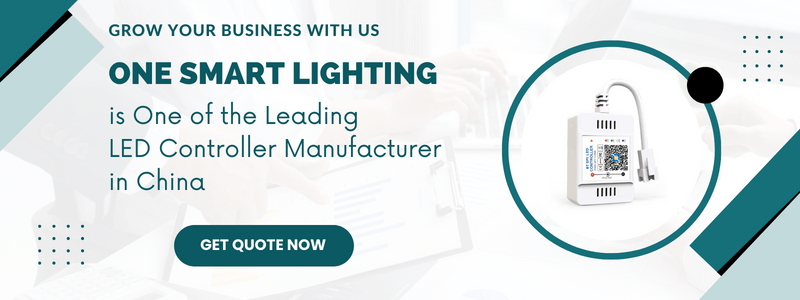In the modern smart home market, LED light controllers are one of the popular product categories. As the demand for smart homes continues to increase, more and more users are paying attention to LED light controllers that are easy to use and multifunctional.
The popularity of Bluetooth technology has brought a better experience for remote control of LED light controllers, allowing users to control lighting through their smartphones or other smart devices. However, achieving Bluetooth remote control is not an easy task, requiring high-quality LED controller chips to achieve this function. Therefore, chips are crucial for the performance and functionality of Bluetooth LED controllers.

Firstly, chips determine the stability of Bluetooth LED controllers. A stable Bluetooth connection is crucial because users cannot tolerate controllers with unstable connections. The stability of the chip determines the signal stability of the controller, so the quality of the chip will directly affect the stability of the LED controller’s connection.
Chips can also affect the LED controller’s response speed and reaction ability. A good chip can help the LED controller respond to user commands faster, improving user experience. Poor chips may cause delays and lag, reducing the user’s experience.
In addition, chips also determine the LED controller’s power consumption and battery life. The chip’s power consumption and optimization will affect the Bluetooth LED controller’s battery life and usage time. Of course, higher quality chips may increase costs but can provide better performance and user experience.
Finally, the quality of the chip also directly affects the LED controller’s ability to expand its functions. If the chip supports more functions and features, the Bluetooth LED controller’s functions will be more comprehensive and rich. For example, some high-quality chips support music control and timing control, enabling the Bluetooth LED controller to meet the user’s needs better.
The chips are very important for Bluetooth LED controllers. A high-quality chip can provide better stability, response speed, power management, and function expansion capabilities, improving user experience. Therefore, to meet users’ needs, manufacturers should choose high-quality chips in the production process to ensure the performance and quality of their products.
Using chips of different qualities can affect the performance of a Bluetooth LED controller.
Power consumption of the Bluetooth LED controller. Lower-quality chips may cause the LED controller to consume more energy, thus reducing its battery life.
Signal strength: The quality of the chip can affect the signal strength of the Bluetooth LED controller. Higher-quality chips can provide stronger signals and better coverage, while lower-quality chips may result in weak or lost signals.
Response speed: The quality of the chip can also affect the response speed of the Bluetooth LED controller. Higher-quality chips can provide faster response times and smoother user experiences, while lower-quality chips may cause delays and lag.
Reliability: The chip’s quality can affect the Bluetooth LED controller’s reliability. Higher-quality chips can provide better stability and reliability, while lower-quality chips may cause an increase in the controller’s failure rate.
Therefore, using high-quality chips for a Bluetooth LED controller can provide better performance and user experience, reduce failure rates, and prolong battery life.
The chip is the core component of a Bluetooth LED controller, and it can significantly impact the controller’s performance and functionality.
Power consumption: The chip’s power consumption can affect the battery life of the Bluetooth LED controller. Low-power chips can increase the battery life of the Bluetooth LED controller.
Signal strength: The chip’s signal strength can affect the coverage range and signal stability of the Bluetooth LED controller. High signal strength chips can improve the signal quality of the Bluetooth LED controller.
The number of connections: The number of connections the chip supports can affect the number of devices the Bluetooth LED controller can connect to. Some high-performance chips can support multiple device connections.
Function support: The chip’s function support can affect the functionality and performance of the Bluetooth LED controller. Some advanced chips support more Bluetooth protocols and functions, such as Bluetooth gateways, Bluetooth mesh networks, etc.
Cost: The cost of the chip is also an important factor. High-end chips are more expensive, while low-end chips are cheaper, which can also affect the cost and price of the Bluetooth LED controller.
There are many types of chips used in Bluetooth LED controllers.
Nordic Semiconductor’s nRF52 series chips are low-power Bluetooth chips supporting the Bluetooth 5.0 standard. They have powerful processing capabilities and low power consumption and are widely used in Bluetooth LED controllers, smart homes, and smart health devices.
Texas Instrument’s CC2540 and CC2541 chips are low-power Bluetooth chips supporting the Bluetooth 4.0 standard. They have excellent performance and low power consumption and are widely used in Bluetooth LED controllers, smart homes, smart watches, etc.
Dialog Semiconductor’s DA14580 chip: This ultra-low power Bluetooth chip supports the Bluetooth 4.0 standard with extremely low power consumption and highly integrated features. It is widely used in Bluetooth LED controllers, smart homes, smart health devices, and more.
Qualcomm’s QCA4020 and QCC5100 chip series are high-performance Bluetooth chips that support the Bluetooth 5.0 standard, with powerful processing capabilities and rich feature sets. They are widely used in Bluetooth audio devices, Bluetooth LED controllers, smart homes, and more.
STMicroelectronics’ BlueNRG chip series: This low-power Bluetooth chip supports the Bluetooth 5.0 standard with excellent performance and low-power consumption features. It is widely used in Bluetooth LED controllers, smart homes, smart health devices, and more.
Each chip has different characteristics and advantages, and the appropriate chip can be selected based on product requirements and application scenarios.
In conclusion, as a professional manufacturer of Bluetooth LED controllers, we are dedicated to providing one-stop smart solutions for our clients. With our expertise and cutting-edge technology, we can tailor our products and services to meet your needs and help you stay ahead in the rapidly evolving market. Don’t hesitate to contact us for more information on how we can assist you in creating innovative and efficient solutions for your business.
Related Articles




